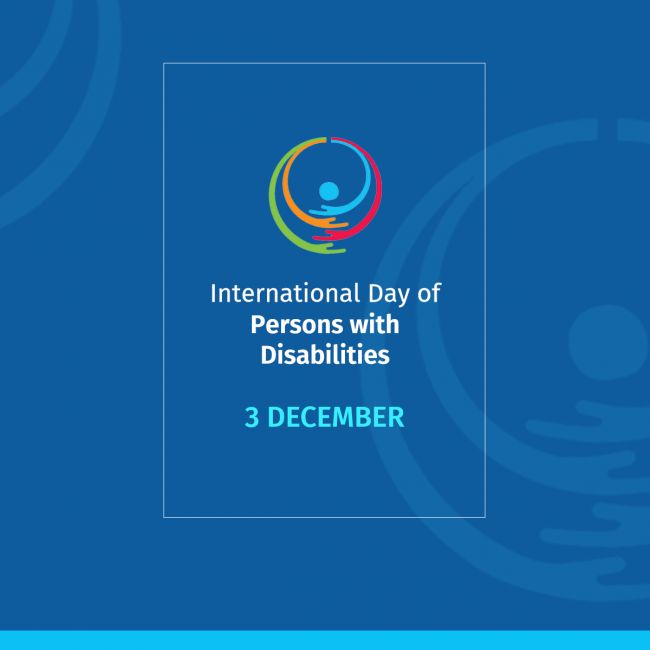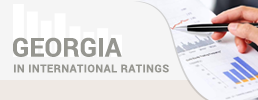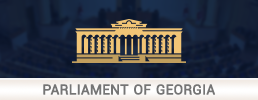2020-12-03

Based on the principles of the UN Convention of the Rights of Persons with Disabilities, and in line with international standards, the state continues to protect and promote the rights of persons with disabilities, including by creating environment maximally adapted to the needs of persons with disabilities, ensuring equal access to public services, inclusive education, professional training/retraining, facilitating employment, social inclusiveness, and awareness raising.
The international principle Nothing About Us Without Us is the Georgian Government's priority. And this means that persons with disabilities are actively involved in making decisions that concern them.
The pandemic has been the cause of serious challenges facing children and adults with disabilities, which is why persons with severe disabilities and children with disabilities are one of the direct target groups under the Georgian Government's anti-crisis plan. At the initial stage of assistance, persons with severe disabilities and children with disabilities received a total of 600-GEL each in the course of 6 months. The next 6-month assistance package will be issued at stage 4 of the anti-crisis plan, to benefit in excess of 43,000 people.
To assist persons with disabilities, the Government of Georgia, throughout the COVID-10 crisis, pays special attention to proving persons with disabilities with access to information and socioeconomic assistance, also to community engagement in line with the Nothing About Us Without Us principle.
Information on virus prevention and regulations has been spread via alternative video sources-such as informative videos adapted for persons with disabilities-and hotlines.
The 112 hotline is equipped with videocall and SMS functions.
As part of the fight against the coronavirus pandemic, the 111 hotline is reserved to serve children with disabilities.
Throughout the crisis, representatives of the Georgian Government maintain continuous cooperation with organizations of persons with disabilities and community representatives, with a view to spreading information, identifying needs, and developing relevant programs.
To ensure access to healthcare for persons with disabilities, access to COVID-19 treatment is provided to every person in the country without discrimination, including persons with disabilities, in line with recommendations from EDF and OHCHR.
To provide streamlined and safe mental health services, the Ministry of Internally Displaced Persons from the Occupied Territories, Labor, Health and Social Affairs has developed a set of guidelines and protocols, Mental Health and COVID-10: National Guidelines for Clinical Practice. The protocol contains national standards for safe patient management in outpatient services under COVID-19.
Throughout the crisis, the country's larger institutions for persons with disabilities have been operating continuously. At the outset of the crisis, the Agency for State Care and Assistance for the Victims of Human Trafficking restructured the service model for the country's larger institutions, with some services provided online, while personnel are continuously supplied with hygiene and safety products.
In cooperation with Georgia red Cross Society and UNDP, homecare programs have expanded, with enhanced engagement from persons with disabilities.
To support parents of children with disabilities, Public Broadcaster launched Mshoblis Saati, a weekly program sharing practical recommendations with parents of children with disabilities, on dealing with the pandemic. For deaf persons and persons with hearing impairment, the show is accompanied by a live sign language interpretation. The project is implemented in cooperation with the Ministry of Education, the Agency for State Care and Assistance for the Victims of Human Trafficking, UNICEF, and MAC Georgia NGO, and with support from the UK Government.
The adoption of a new law on the protection of the rights of persons with disabilities is a noteworthy achievement in 2020. The new law is a big step forward taken under the leadership of the Justice Ministry toward stronger protection of the rights of persons with disabilities and the alignment of these rights with international standards.
One of the most significant innovations under the new law on persons with disabilities involves the recognition of the Georgian sign language by the state. The Georgian sign language is a means for communicating with deaf persons and persons with hearing impairment in Georgia. It is fully vision-based. The state recognizes the Georgian sign language as a means of human communication, and one of the ways for deaf persons and persons with hearing impairment to access education, and ensures conditions necessary for its use and development. This recognition of the Georgian sign language at the state level is the first precedent in the country.
The law also obligates the state to establish an environment adapted to the needs of persons with disabilities and to adapt the existing environment, namely gradual adaption of existing buildings and facilities to the needs of persons with disabilities in the course of 15 years, and new buildings must be accessible and adapted to relevant needs at the outset.
The project also involves the introduction of personal assistant services at the municipal level, which will help persons with disabilities in living independently.
Another important innovation under the new law involves switching over from medical approaches to a biopsychosocial model in defining the status of a person with disabilities. The new approach allows for granting a status of a person with disabilities based not only on medical records, but also on the assessment of the given person's actual needs. The same principle defines the volume of social security guarantees.
To provide persons with access to justice administration, the new law also establishes new special advocacy institutions, organizations defending the rights of persons with disabilities in court without any barriers and the needs to obtain additional authority.
The law obligates the state and administrative bodies to protect the rights of persons with disabilities.
Access to public services is one of the key aspects of protecting the rights of persons with disabilities. To ensure access to services, the administrative building of the Justice Ministry and Public Service Halls are fully accessible to persons with disabilities. These buildings are equipped with special wheelchair ramps and elevators meeting international standards. Consequently, persons using wheelchairs can move around said territories without obstacles. In the same vein, blind persons and persons with visual impairment can move around independently, using tactile paving and Braille-inscribed boards indicating direction (navigation maps) in service halls and adjacent territories.
Other public facilities are also adapted to suit the needs of persons with disabilities, such as the Exhibition Hall and Administration of the National Archives, the National Bureau of Enforcement, Enforcement Police facilities, and others.
Filtration on the official website of the Notary Chamber enables persons with disabilities to locate adapted branches where they can enter/exit without obstacles.
The Public Service Hall is the first state institution to have adopted service standards for persons with disabilities, with almost 700 operators retrained, and a special manual published to assist other agencies.
The Public Service Hall has developed new sign symbols for deaf persons and persons with hearing impairment. Previously nonexistent in the sign language vocabulary, they simplify language for interacting with the state. Deaf persons and persons with hearing impairment now can use sign language to communicate with public service hall operators. To that end, 32 operators have already learned sign language.
The Public Service Development Agency offers deaf persons and persons with hearing impairment over 40 services that can be enjoyed without leaving home. Qualified specialists provide consultations using sign language.
Presently, 2 penitentiaries throughout the country are adapted for persons with disabilities, and one penitentiary runs an adapted medical facility.
Deaf persons and persons with hearing impairment can communicate with 112 through SMS or videocalls.
The infrastructure of visitor centers in protected territories is adapted for persons with disabilities, namely:
• Kolkheti National Park's visitor center, hotel, and fishing area
• Lagodekhi Protected Area's hotel, cafeteria, camping ground
• Kazbegi National Park's visitor center
• Mtirala National Park's visitor center
• Kobuleti and Kintrishi Protected Area's visitor center
• Javakheti Protected Area's visitor center
• Algeti National Park's visitor center
• Martvili Canyon's visitor center.
All projects by the Municipal Development Fund of Georgia are fully adapted for persons with disabilities: schools, kindergartens, refugee residentials, recreation areas, tourist infrastructure, cultural sites, and athletic infrastructure.
To support employment among persons with disabilities, fully adapted and individual needs-based professional retraining courses for persons with disabilities are underway, in cooperation between the Government Administration, the Ministry of Education, and the Office of the United Nations High Commissioner for Human Rights. In addition, students with disabilities are integrated into schools of professional education.
To support employment among persons with disabilities, the Employment Support State Agency provides regular employment support services by seeking paid jobs for persons with disabilities and assisting them in keeping these jobs.
Continuous upgrading of inclusive education is the Education Ministry's priority. Almost 10,000 students with special educational needs study in public schools.
TV school now provides classes in the Georgian sign language.
Wheelchair ramps are installed in stages at public schools.
Braille books are printed for students with special educational needs, and audio versions of textbooks have been developed for blind students.
To improve quality, inclusive education is regularly monitored at general and professional education levels.
Persons with disabilities enjoy wage subsidies, which is achieved through an agreement with employers and targets beneficiary workers on new or existing jobs.
To foster employment, the Professional Training/Retraining and Qualification Enhancement State Program for Job Seekers has been underway since 2016. Under the Development Program for Services Supporting Employment, regular group consultations, employment forums, and supportive employment and subsidy services are also provided.
In 2019, Georgians para-athletes garnered 150 medals in various sports, World and European Championships, and various international competitions.
On the Georgian Government's decision, 1,000-GEL monthly state stipends were established for Paralympics winners.
Access to healthcare for persons with disabilities is provided by the Georgian Ministry of Internally Displaced Persons from the Occupied Territories, Labor, Health and Social Affairs. Access to healthcare for persons with disabilities is ensured through the State Universal Healthcare Program.
For persons with disabilities, the state runs the annual Program for Social Rehabilitation and Childcare, to provide various types of services to beneficiaries:
• Subprogram for Early Childhood Development
• Subprogram for Rehabilitation/Habilitation
• Daycare Center Subprogram
• Subprogram for Supporting Communication among Deaf Persons
• Subprogram for Small Family-Type Homes
• Subprogram for Community Organizations
• Subprogram for Homecare for Children with Severe and Deep Mental Developmental Disabilities
• Subprogram for Specialized Family-Type Services for Children with Deep and Severe Disabilities or Health Issues
• Subprogram for Providing Assistive Technology.
The amount of social assistance for persons with severe disabilities was set at 125 GEL since April of 2013. The assistance package gradually doubled to make up 250 GEL by July of 2020.
Social packages gradually also increased for persons with severe disabilities and children with disabilities, namely to make up 100 GEL since 2013, 120 GEL since 2019, and 140 GEL since 2020.
The amount of social packages for children with disabilities was set at 100 GEL in 2013, to increase to 250 GEL since July of 2020.
To support persons with disabilities, the Ministry of Health and Social Affairs is implementing the following:
The Subprogram for Providing Assistive Technology seeks to enhance the functional independence and social integration of persons with disabilities and senior citizens. The subprogram includes several components, such as wheelchair supplies and support for employment among persons with disabilities, orthotics and prosthetics, hearing aids, cochlear implants, crutches, canes, white canes, and walkers.
Subprogram for Homecare for Children with Severe and Deep Mental Developmental Disabilities targets rehabilitation (physical, intellectual, mental) of children with deep and severe mental developmental disabilities, improve their physical and social conditions, and support their families by providing homecare services.
Subprogram for Specialized Family-Type Services for Children with Deep and Severe Disabilities or Health Issues seeks to place children with deep and severe disabilities or health issues in family-type homes and caring and raising them in conditions similar to family environment.
Subprogram for Early Childhood Development provides early intervention services to stimulate the development of children with disabilities, developmental disorders, or relevant risks, supporting their engagement in preschool and general education programs and social integration, empowerment of child and family, and prevention of limitation of opportunities and abandonment. Since inception, the geographic access to the subprogram has increased significantly. If 5 service providing organizations in 2 municipalities (Tbilisi, Kutaisi) were registered in 2012, their number increased to 35 in 14 municipalities by 2020. Consequently, the numbers of beneficiaries also increased, from 83 children in 2012 to 1,513 in the first 6 months of 2020. Since 2017, Minimal Standards for Children's Early Intervention Services have been enforced, a significant component for enhancing the quality of the subprogram.
Daycare Center Services Subprogram is designed to support the families of the target group, also to ensure prevention of abandonment, and social inclusiveness. Under the subprogram, daycare centers serve children with deep and severe mental developmental disabilities under the risk of abandonment, also persons with disabilities. Also, in line with Standards of Daycare Centers for Persons with Disabilities, quality improvement effort is in full swing.
Subprogram for Rehabilitation/Habilitation is designed to ensure the specific rehabilitation and habilitation of the targeted group of children, improvement of their physical health, enhancement of adaptational abilities, and promotion of social integration. The number of courses financed under the subprogram has grown, and so has the number of its beneficiaries.
Subprogram for Supporting Communication among Deaf Persons seeks to foster the target group's social integration. The subprogram is implemented by the Health Ministry in 8 Georgian regions, while being financed by City Hall in Tbilisi. The subprogram seeks to facilitate interaction with public institutions and individuals through deaf interpreters. Almost 2,000 enjoy the subprogram's services every year. And, with deaf persons requiring assistance, services can be requested by any public agency.
In addition, under Program for Hearing Aid Provision, persons with disabilities of all ages (children to senior citizens) receive hearing aids, as need be.
In 2020, procedures for issuing hearing aids to senior citizens were simplified. In 2019, a component for providing persons with disabilities with technical devices (smartphones) equipped with videoconference functions was added to the Subprogram for Assistive Technology.
For the purpose of prevention and early intervention, newborn hearing screening is already adopted in Tbilisi and several regions. Next year, nationwide hearing screening coverage is expected to be put in place.
Through interagency cooperation, governmental institutions, together with nongovernmental and international partners, and with engagement from persons with disabilities, continue protecting the rights of persons with disabilities in line with international standards and values.











